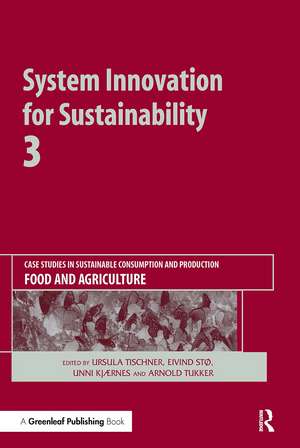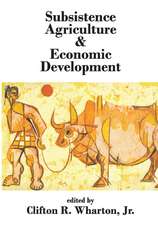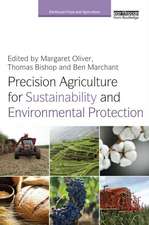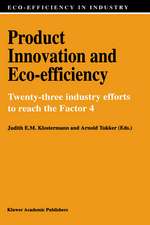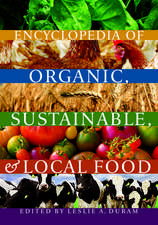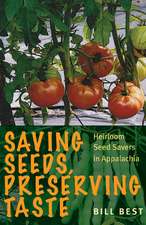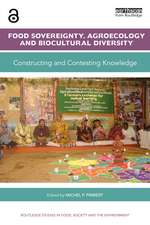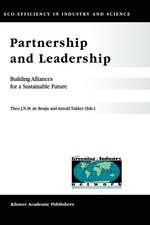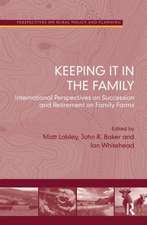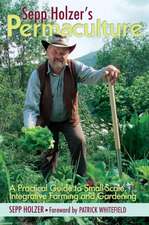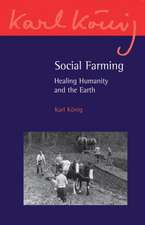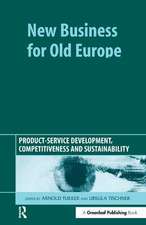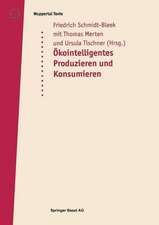System Innovation for Sustainability 3: Case Studies in Sustainable Consumption and Production � Food and Agriculture
Editat de Ursula Tischner, Eivind Stø, Unni Kjærnes, Arnold Tukkeren Limba Engleză Paperback – 14 oct 2024
| Toate formatele și edițiile | Preț | Express |
|---|---|---|
| Paperback (1) | 262.55 lei 6-8 săpt. | |
| Taylor & Francis – 14 oct 2024 | 262.55 lei 6-8 săpt. | |
| Hardback (1) | 1113.91 lei 6-8 săpt. | |
| Taylor & Francis – iul 2010 | 1113.91 lei 6-8 săpt. |
Preț: 262.55 lei
Preț vechi: 305.22 lei
-14% Nou
Puncte Express: 394
Preț estimativ în valută:
50.24€ • 53.72$ • 41.89£
50.24€ • 53.72$ • 41.89£
Carte tipărită la comandă
Livrare economică 17 aprilie-01 mai
Preluare comenzi: 021 569.72.76
Specificații
ISBN-13: 9781032922959
ISBN-10: 1032922958
Pagini: 312
Dimensiuni: 156 x 234 mm
Greutate: 0.58 kg
Ediția:1
Editura: Taylor & Francis
Colecția Routledge
Locul publicării:Oxford, United Kingdom
ISBN-10: 1032922958
Pagini: 312
Dimensiuni: 156 x 234 mm
Greutate: 0.58 kg
Ediția:1
Editura: Taylor & Francis
Colecția Routledge
Locul publicării:Oxford, United Kingdom
Public țintă
Academic and PostgraduateCuprins
1. IntroductionUrsula Tischner, econcept, Germany, Eivind Stø and Unni Kjærnes, SIFO, Norway, and Arnold Tukker, TNO Built Environment and Geosciences, The Netherlands; Norwegian University of Science and Technology (NTNU)2. Sustainable consumption and production in the agriculture and food domainUrsula Tischner, econcept, Germany and Unni Kjærnes, The National Institute for Consumer Research (SIFO), Norway3. Facilitating a more sustainable food and farming sector in the UK*Paul Dewick and Chris Foster, Manchester Institute of Innovation Research, UK and Steve Webster, Delta-innovation Ltd, UK4. Self-sufficiency or localisation? Sustainability and ambiguity in Britain's food policyTim Cooper, Nottingham Trent University, UK5. Transition towards sustainable consumption and production? The case of organic food in DenmarkMichael Søgaard Jørgensen, DTU Management Engineering, Technical University of Denmark6. Socioeconomic aspects of farmers' markets in Sweden Helen Nilsson and Oksana Mont, International Institute for Industrial Environmental Economics, Lund, Sweden 7. Open Garden: a local organic producer–consumer network in Hungary, going through various levels of system innovation Edina Vadovics, Central European University, Department of Environmental Sciences and Policy, and GreenDependent Sustainable Solutions Association; Matthew Hayes, Institute for Environmental Management, Szent István University and Nyitott Kert Alapitvány 8. Slow Food: counteracting fast food and fast living Ingrid Kjørstad, National Institute for Consumer Research (SIFO) 9. Sambazon: creating environmental and social value through marketing the açai berry; sustainable agro-forestry practices in the Brazilian Amazon Burcu Tunçer and Patrick Schroeder, UNEP/Wuppertal Institute Centre for Sustainable Consumption and Production (CSCP), Wuppertal, Germany 10. Fairtrade Max Havelaar Norway: the Norwegian labelling organisation for fair trade Ingri Osmundsvåg, National Institute for Consumer Research (SIFO), Norway 11. Verified sustainable agriculture: a practical experience and a significant contribution to sustainable consumption and production Chris Wille and Joke Aerts, Rainforest Alliance Bernward Geier, Colabora 12. Life events as turning points for sustainable nutrition Martina Schäfer and Adina Herde, Technische Universität Berlin, Germany and Cordula Kropp, University of Applied Sciences, Germany 13. Sustainable consumption and production (SCP) of food: overall conclusions on SCP in the food and agriculture domain Ursula Tischner, econcept, Agency for Sustainable Design, Germany, Eivind Stø, National Institute for Consumer Research (SIFO), Norway and Arnold Tukker, TNO Built Environment and Geosciences, The Netherlands; Norwegian University of Science and Technology
Notă biografică
Ursula Tischner, Eivind Stø, Unni Kjærnes, Arnold Tukker
Descriere
Focuses on providing answers to the question of how food production and consumption systems can stay within the limits of the carrying capacity of our natural environment. This work also considers the challenges of food security and nutrition in the context of sustainability and a growing world population.
